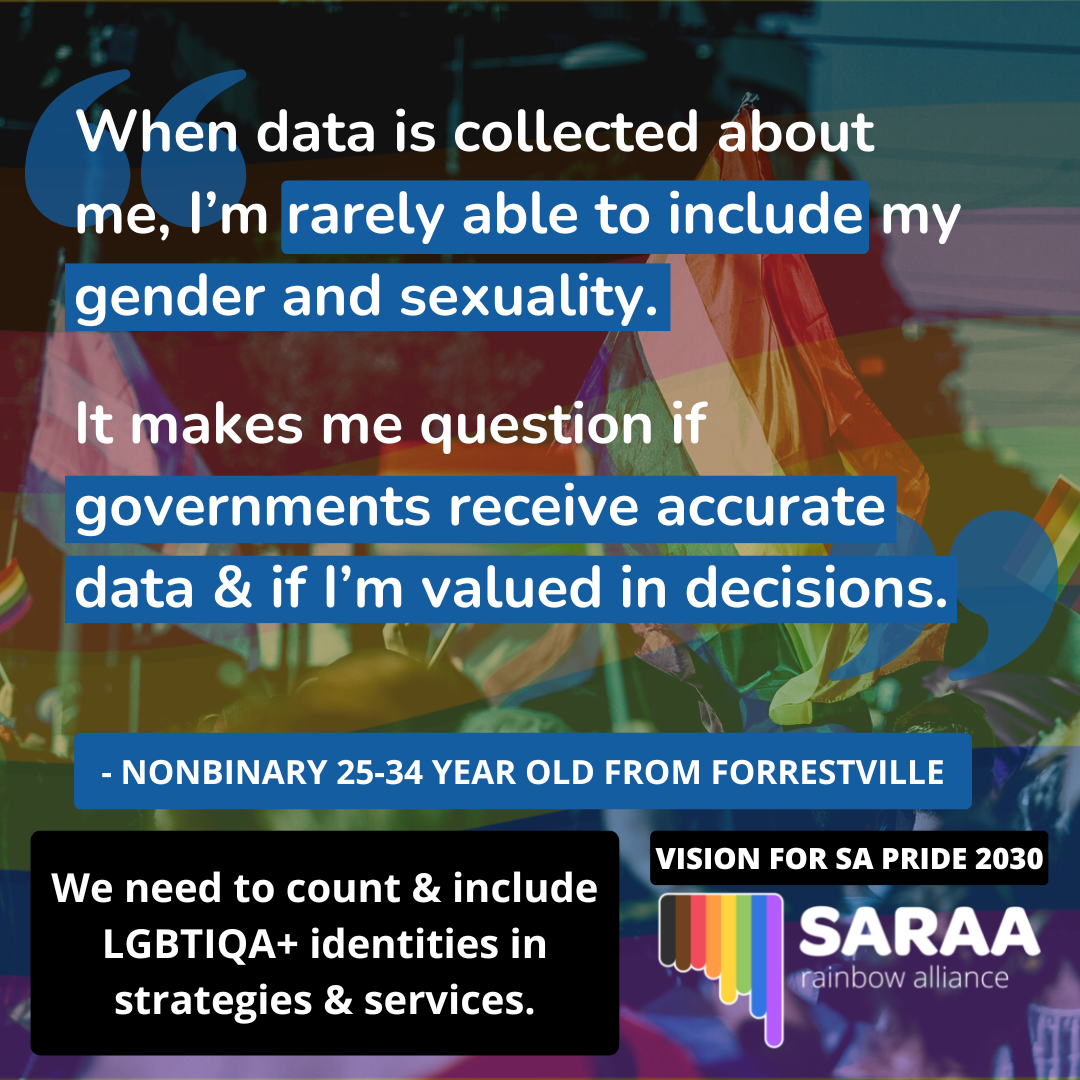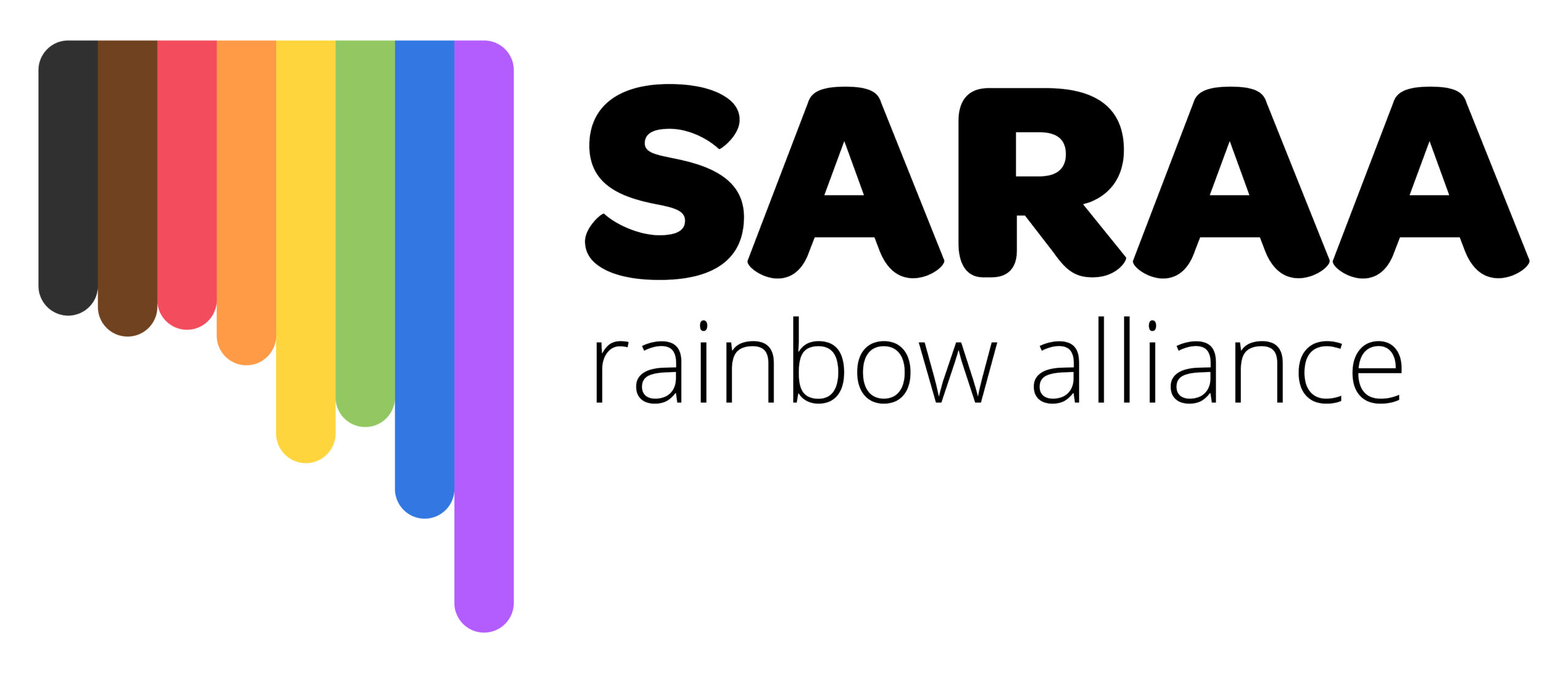LGBTIQA+ South Australians are frequently not counted in government data or statistics.
On an individual level, this serves to invalidate the experiences of LGBTIQA+ people and perpetuate feelings of invisibility for our communities.
On a systems level, this systematically erases LGBTIQA+ identities and means we’re left behind when policies, laws and services are planned.
In public policy making and service design, we know that what gets measured matters. So when data collection excludes us, we lack the evidence base to demonstrate the need for healthcare, housing, aged care and other essential services for our community.
Our position statement sets out what the South Australian government must do to count our identities properly in data collection and statistics.

Why is this important?
LGBTIQA+ South Australians experience unique barriers to accessing health and community services. There remains a lack of information, data and education that currently exists about our needs. This lack of inclusive data collection means that often the needs of our communities go unidentified and services are inaccessible or inappropriate for LGBTIQA+ people.
LGBTQIA+ inclusive data collection is vital to:
- identifying barriers and gaps in service provision for LGBTIQA+ communities
- developing strategies and approaches to create LGBTIQA+ appropriate services
- changing practice to include LGBTIQA+ communities
- signalling to LGBTIQA+ people that the service is a safe and supportive place for them.
Nevertheless, there remain a number of challenges in collecting data about LGBTIQA+ communities, including:
- questions about one’s gender identity, sex, sexual orientation and intersex variation being viewed as intrusive in nature
- history of discrimination and abuse of LGBTIQA+ people by public institutions
- fear of homophobia, transphobia, biphobia or intersexphobia by services
- perceptions of LGBTIQA+ people that they won’t be taken seriously or believe
- some LGBTIQA+ people not being “out” to members of one’s family or social supports
- LGBTIQA+ people not knowing how the information will be used or where it might be published
- organisations asking for information about one’s gender identity, sex, sexual orientation and intersex variation in an insensitive and disrespectful manner.
I’ve had a medical practice ask for “birth sex” which is a really unsettling choice of wording. That same form also had a section to select gender giving Male/ Female/ Trans/ Non-binary with only one choice. There was no way to say I was female and trans in a way that made me feel comfortable.
– 35 year old trans woman from Cowandilla and South Australian LGBTIQA+ Community Advisory Group member
What needs to be done?
At the SA Rainbow Advocacy Alliance, we know that what gets measured matters. Collecting information about one’s sexual orientation and gender identity is necessary for services to appropriately address the needs of LGBTIQA+ South Australians.
The challenges and complexities in collecting data about LGBTIQA+ communities create the need for a Data collection standard that guides organisations how to respectfully request information about a person’s gender identity, sex, sexual orientation and intersex variation.
In July 2021 the South Australian Government published a Data Collection and Gender Guideline: Data collection and working with the LGBTIQA+ community, based on the ABS (2020) Standard for Sex, Gender, Variations of Sex Characteristics and Sexual Orientation Variables. The implementation of the guideline across Government remains inconsistent and ad hoc at the discretion of individual public sector agencies.
While the guideline makes a great start on collecting data about gender identity, unlike it’s ABS counterpart it makes no mention of appropriate methods of data collection regarding:
- sexual orientation
- variations of sex characteristic, also known as an intersex variation.
We also recognise that the ABS (2020) Standard for Sex, Gender, Variations of Sex Characteristics and Sexual Orientation Variables fails to specifically include asexual as a standalone data element in questions about sexual orientation. In comparison to other sexualities, asexuality is frequently erased even in LGBTIQA+ communities. Recognising asexuality in data collection standards is a first step towards understanding the prevalence and needs of asexual communities.
Questions need to be asked in a respectful way using best practice methods and with clear guidelines.
Governments need to take into consideration our privacy and who has access to our information, as well as for what purpose it will be collected so people have agency over what they disclose.
– South Australian LGBTIQA+ Community Advisory Group member
Recommendations
To count our identities properly in data collection and statistics we recommend:
- the South Australian Government update the existing Data Collection and Gender Guideline to include guidance on collecting data about sexual orientation and variations of sex characteristic in line with the relevant ABS Standard
- the South Australian Government mandate the implementation of the reviewed Data Collection and Gender Guideline across the public sector
- all South Australian health and social service providers implement the reviewed Data Collection and Gender Guideline in their organisations
- the Australian Bureau of Statistics update the ABS (2020) Standard for Sex, Gender, Variations of Sex Characteristics and Sexual Orientation Variables to include asexual as a standalone data element in questions about sexual orientation.
For more information about how to collect information about LGBTIQA+ communities visit www.saraa.org.au/lgbtiqa-data/.
